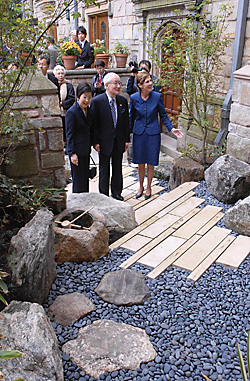 | Vice President Linda Koch Lorimer (right) surveys the Kan'ichi Asakawa Garden at Saybrook College with Japanese Ambassador Ryozo Kato and his wife, Hanayo Kato. |
A campus garden has been created in honor of Kan’ichi Asakawa (1873-1948), a Yale alumnus and professor who is considered
the founder of the field of East Asian studies in the United States and who sought
to improve U.S.-Japanese relations on the brink of World War II.
T H I S
Garden honors scholar who sought
to improve Japanese-U.S. relations
Asakawa earned his Ph.D. from Yale in history in 1902. He later became a faculty
member and served as the first curator of the East Asia Collection in Sterling
Memorial Library. He was the first Japanese professor to teach at a major American
college or university.
The Japanese-style garden, designed by Shin’ichiro Abe of Zen Associates
of Boston, is located within Killingworth Courtyard of Saybrook College, where
Asakawa was a resident faculty fellow in the 1930s. The formal dedication ceremony,
jointly planned by the Office of International Affairs and the Council on East
Asian Studies, took place on Oct. 12.
Ryozo Kato, Japan’s ambassador to the United States, spoke at the dedication,
which also featured remarks by Linda Koch Lorimer, vice president and University
secretary, and other dignitaries. Edward Kamens, the Sumitomo Professor of Japanese
Studies and director of graduate studies in East Asian languages and literatures
and in East Asian studies, chaired the garden planning committee, which included
faculty, staff and students.
Born in Nihonmatsu, Japan, in 1873, Asakawa studied at the precursor of what
is today Waseda University and then earned his bachelor’s degree from Dartmouth
College before enrolling in the Yale Graduate School in 1899. He wrote his dissertation
on reforms during the Taika era and was a scholar of Japan’s feudal history.
He was also deeply immersed in international affairs relating to Japan. His 1904
work, “The Russo-Japanese Conflict: Its Causes and Issues,” written
shortly after the outbreak of war that year, was widely credited with turning
the world’s opinion in favor of Japan. After the war, he participated in
the U.S.-mediated Portsmouth Peace conference as an observer.
Asakawa went back to Japan in 1906 to collect materials for the Yale libraries and for the Library of Congress, and
on his return to the United States he was appointed an instructor in Japanese
history and civilization at Yale. He taught at the University for 36 years until
his retirement from the Department of History in 1942, but continued as curator
of the East Asian Library until 1948, the year of his death. Asakawa’s
grave in Grove Street Cemetery is visited every year by busloads of travelers
from Japan.
Throughout his life, Asakawa promoted international peace and amicable relations
between the United States and Japan. In 1941, he led a campaign to urge President
Franklin D. Roosevelt to send a personal letter to Emperor Hirohito to avert
the coming of the war. The letter, which went through numerous revisions, reached
Tokyo hours after the first warplane left for Pearl Harbor.
The garden was created through the generosity of Asakawa Kensho Kyokai (Asakawa
Peace Association), Waseda University, Yale alumnus Charles Schmitz (1960 B.A.,
1963 LL.B.) and many other donors.
 W E E K ' S
W E E K ' S S T O R I E S
S T O R I E S![]()
 New facility is place where ‘future of medicine’ can unfold
New facility is place where ‘future of medicine’ can unfold![]()
![]()
 Facility balances researchers’ needs with environmentally friendly features
Facility balances researchers’ needs with environmentally friendly features![]()
![]()
 Alumnus’ gift supports ‘critical’ work at F&ES
Alumnus’ gift supports ‘critical’ work at F&ES![]()
![]()
 Yale affiliates to exhibit photographs, games and paintings at art festival
Yale affiliates to exhibit photographs, games and paintings at art festival![]()
![]()
 Yale’s United Way fundraising goal set at $1.2 million
Yale’s United Way fundraising goal set at $1.2 million![]()
![]()
 SCHOOL OF MEDICINE NEWS
SCHOOL OF MEDICINE NEWS
 Yale to take part in national study examining children’s health
Yale to take part in national study examining children’s health![]()
 Three members of faculty elected to Institute of Medicine
Three members of faculty elected to Institute of Medicine![]()
 Dr. David Fiellin receives NIH grant . . .
Dr. David Fiellin receives NIH grant . . .![]()
 Chronic Lyme disease does not exist, researchers report
Chronic Lyme disease does not exist, researchers report![]()
 Spouses follow suit in health behaviors, study reveals
Spouses follow suit in health behaviors, study reveals![]()
![]()
 Museum honorees to ponder ‘The Future of Life on Earth’
Museum honorees to ponder ‘The Future of Life on Earth’![]()
![]()
 ‘The Greening of Yale and Beyond’ is topic of symposium
‘The Greening of Yale and Beyond’ is topic of symposium![]()
![]()
 Symposium to examine the intersection of faith and politics
Symposium to examine the intersection of faith and politics![]()
![]()
 ‘21st Century Democracy’ is the theme of Law School reunions
‘21st Century Democracy’ is the theme of Law School reunions![]()
![]()
 IN MEMORIAM
IN MEMORIAM
 Deno Geanakoplos: One of world’s foremost Byzantine scholars
Deno Geanakoplos: One of world’s foremost Byzantine scholars![]()
 Felix Zweig: Former dean’s impact still felt in Yale engineering today
Felix Zweig: Former dean’s impact still felt in Yale engineering today![]()
![]()
 Exhibit examines post-war effort to halt the spread of communism . . .
Exhibit examines post-war effort to halt the spread of communism . . .![]()
![]()
 Campus Notes
Campus Notes![]()
Bulletin Home |
| Visiting on Campus
Visiting on Campus |
| Calendar of Events
Calendar of Events |
| In the News
In the News![]()
Bulletin Board |
| Classified Ads
Classified Ads |
| Search Archives
Search Archives |
| Deadlines
Deadlines![]()
Bulletin Staff |
| Public Affairs
Public Affairs |
| News Releases
News Releases |
| E-Mail Us
E-Mail Us |
| Yale Home
Yale Home